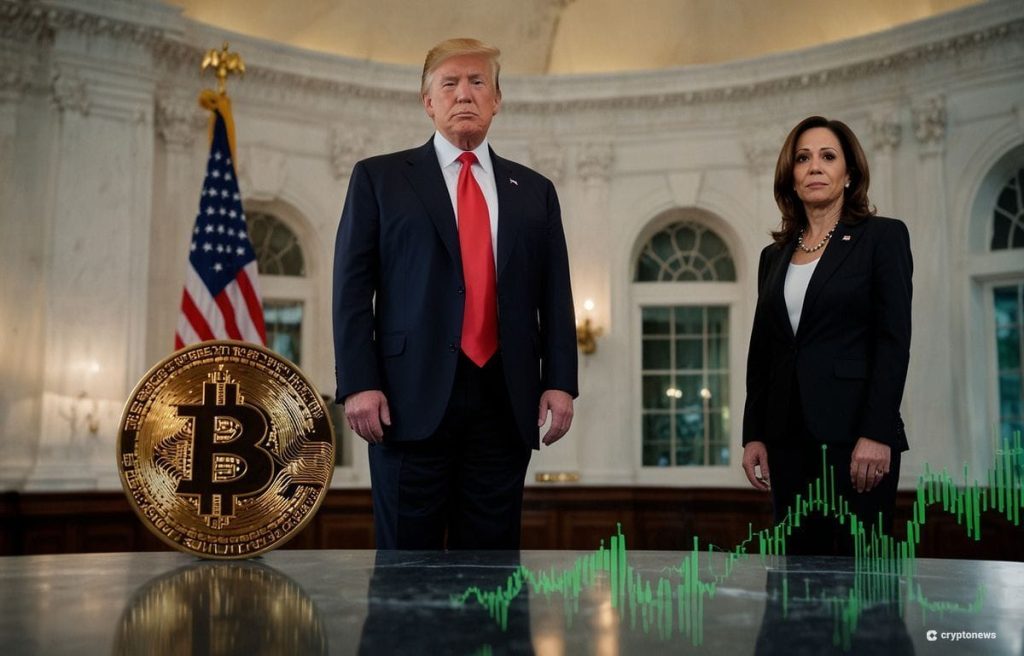BlackRock CEO Larry Fink recently stated that the outcome of the 2024 U.S. election may not significantly impact Bitcoin’s long-term trajectory. Fink believes that Bitcoin is an asset class in itself, capable of transcending global politics. He noted that continued crypto adoption depends on liquidity and transparency rather than regulation. Fink stated that creating more accessibility, transparency, and analytics related to digital assets will lead to their expansion. He expressed his belief that digital assets’ utilization will become more widespread worldwide regardless of jurisdiction.
Former President Donald Trump currently leads on Polymarket as the favored candidate for the 2024 U.S. election. Trump is known for being more innovation-friendly towards the crypto industry and has plans to make the U.S. the global “crypto capital” if re-elected. Recently, Trump announced plans to launch his own coin in association with the DeFi project World Liberty Financial. Vice President Kamala Harris has also made statements on crypto policy, aiming to establish clear regulations for digital assets. This growing bipartisan support for cryptocurrencies is evident through their endorsements. However, Fink’s comments raise questions about whether the outcome of the election will have a significant impact on the crypto industry.
Despite Larry Fink’s belief that politics may not have a substantial impact on Bitcoin, regulation remains a crucial element for the cryptocurrency industry, especially in the U.S. The U.S. Securities and Exchange Commission (SEC) Commissioner Mark Uyeda has criticized the SEC’s approach to crypto regulation, labeling it a “disaster” due to the lack of clear guidance. The SEC faces widespread criticism for its “regulation-by-enforcement” strategy, with critics arguing that the agency has failed to establish a clear regulatory framework for cryptocurrencies. A coalition of seven U.S. states has challenged the SEC’s cryptocurrency regulation, arguing that it stifles innovation, harms the industry, and exceeds the agency’s authority. They contend that the current regulatory landscape is too ambiguous and punitive, hindering the growth of the cryptocurrency sector.
The cryptocurrency industry continues to face uncertainty and challenges related to regulation and political developments. Despite Larry Fink’s assertion that Bitcoin can transcend global politics, the regulatory environment remains a significant factor impacting the industry’s growth. The ongoing criticism of the SEC’s regulatory approach highlights the need for clearer guidelines to foster innovation and development. With former President Trump leading as the favored candidate for the 2024 U.S. election and advocating for a more innovation-friendly approach, the industry is closely watching the political landscape for potential implications on crypto policies. Overall, the future of the cryptocurrency industry may be shaped by a combination of regulatory frameworks, political developments, and market forces.
In conclusion, the cryptocurrency industry is navigating a complex landscape influenced by political developments, regulatory challenges, and market dynamics. While BlackRock CEO Larry Fink believes that Bitcoin can transcend global politics, the role of regulation remains crucial for the industry’s growth and development. The current regulatory environment in the U.S., particularly the SEC’s approach to crypto regulation, has faced criticism for its lack of clarity and punitive measures. The debate over regulatory frameworks, alongside the 2024 U.S. election and the potential implications for crypto policies, underscores the uncertainties and challenges facing the industry. As stakeholders and regulators continue to navigate these issues, the future of the cryptocurrency sector will likely be shaped by a combination of regulatory oversight, political decisions, and market trends.


